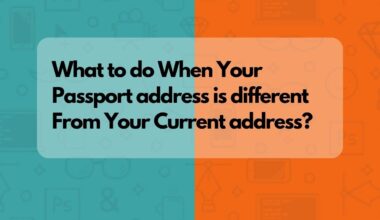As an Amazon Associate, I earn a small commission from qualifying purchases. Learn more about this.
Passport applications can be a bit tricky, especially when you reach that one specific field – “Place of Birth.”
If you’ve found yourself staring at that blank space wondering what to fill in, you’re not alone.
Let’s break it down and make it simple for you.
What to put for place of birth on passport
Deciding exactly what to write in the ‘place of birth’ section of your passport application can feel like a puzzle.
Well, firstly, you should know that this isn’t just a formality. The ‘place of birth’ is a key piece of information that helps identify you. It’s used not only for travel but also for legal and administrative purposes.
So, getting it right is important.
1. Stick to the Basics:
Start with the name of the city or town where you were born, followed by the country. For most people, this is straightforward.
But, let’s say you were born in a city like Leningrad, which is now known as Saint Petersburg. In such cases, use the current name – Saint Petersburg.
2. Special Cases:
Now, what if you were born in a place that’s off the beaten path? I have a friend who was born in a small village in the mountains.
Her birth certificate didn’t even have a town name, just a region.
She used the name of the nearest town, as advised by the passport office.
So, if your birthplace is a bit unusual, think of the closest town or city. That’s what you should write.
3. Historical Changes Matter:
Our world is always changing Places change, Cities and towns might get new names, Countries evolve, borders shift.
If you were born in a place that’s now part of a different country (think of cities in the former Soviet Union, for example), use the current country’s name.
It keeps things clear and up-to-date.
4. Birth in Transit:
Sometimes, people are born while traveling, like on a plane or a ship.
This is rare, but it happens. If this is you, write down the country that the plane or ship was registered in, or the nearest place it landed after you were born.
5. Multiple Names:
Some cities have more than one name, maybe in different languages. Use the name that’s most commonly used in the country where you apply for your passport.
And always look at your official documents, like your birth certificate, for the right name. These documents have the information that government offices need.
6. When in Doubt, Ask:
If you’re unsure, it’s perfectly okay to seek guidance.
Reach out to the passport authority or even the embassy or consulate of the country where you were born.
They deal with these questions all the time and can offer you the correct advice.
Common Questions Answered
- What if I was born in a small village? Use the name of the nearest well-known city or town.
- My birthplace has a new name now. Which one should I use? Always use the current name of the place.
- Does the hospital name need to be included? No, just include the city or town and country.
- I was born in a disputed territory. What should I write? In such cases, write the name of the territory as it’s most commonly known, or consult with the passport authority for guidance.
- What if I don’t have a birth certificate? If you don’t have a birth certificate, use any other official document that states your place of birth, like a national ID or a baptismal certificate.
- How precise does the location need to be? You don’t need to be overly specific. The city or town and country are sufficient.
- I was born at home, not in a city. What should I enter? Enter the name of the nearest town or city. If unsure, refer to any official record or document that mentions your birthplace.
Why Place of Birth Matters
Now, why all this fuss about the place of birth on a passport?
Well, it’s more than just a piece of information. It’s a key part of your identity in the eyes of the world.
1. Identity Verification: The place of birth is a fundamental detail used worldwide to confirm who you are. Think of it as a unique tag, just like your name, but it tells more about your roots. When you travel, immigration officers look at this to match you with your records.
2. Legal and Administrative Uses: Beyond travel, your place of birth is important for legal stuff. It’s used in government records, can impact your eligibility for certain services, and sometimes even matters in legal cases.
3. Dual Citizenship and Heritage: Here’s something interesting. Your birthplace can affect your eligibility for dual citizenship in some cases. Countries have different rules, and your place of birth might open doors to a second citizenship. It’s also a part of your heritage, a link to where you come from, which can be pretty special.
4. Security and Compliance: In today’s world, accurate identification is crucial for security. Governments need to ensure that people are who they say they are, and the place of birth is a piece of that puzzle.
Conclusion
Filling out your passport application correctly is crucial, and understanding how to accurately enter your place of birth is a big part of that. Remember, this isn’t just a formality; it’s a part of your identity. Take your time, double-check your details, and you’ll be on your way to having your passport in hand







